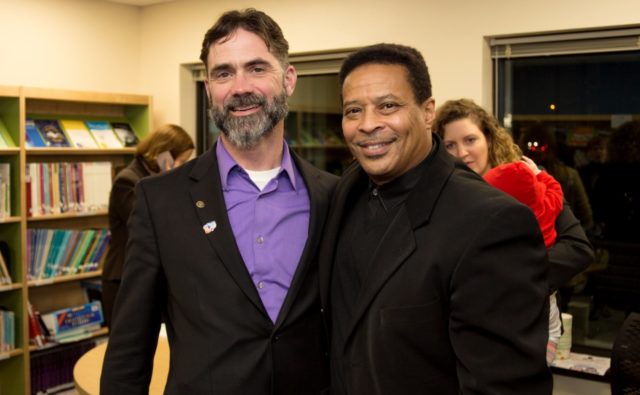
“The Literacy Network will always be a big part of me. I’ve done this work for a really long time and I love it and I’m really going to miss it,” says Literacy Network Executive Director Jeff Burkhart. “I am grateful for all of the support we’ve received over the years.”
For the past 14 years, Jeff Burkhart has been responsible for the overall direction and leading the growth of Literacy Network, a Madison non-profit organization founded in 1974 that teaches reading, writing and speaking skills to Dane County adults so they can achieve financial independence, good health, and greater involvement in community life. Burkhart recently announced that the “time to open the door for others to lead Literacy Network has come” and that he would be resigning his position as executive director. His last day will be Dec. 16.
“It’s really important that folks have access to the thing that’s going to get them closer to their dreams of earning more money, having a sustainable career, being able to support their families,” Burkhart says. More than 55,000 adults struggle with low literacy in Dane County and studies show that poverty and illiteracy are closely linked and that adult literacy education leads to long-term improvements in the lives of learners and their families.
“The biggest and most important things in my mind are decreasing poverty and increasing opportunity for students,” Burkhart says. “We know that students, when they have worked as adult learners in an adult education program for more than 100 hours, they’re going to see significant changes in their lives … they’re gonna see increased earnings, they’re gonna see opportunities to complete certificates and degrees.”
About 93 percent of the students that Literacy Network serves are people of color. Burkhart says that one study showed that with more than 100 hours of study, eventually people are earning a little more than $9,000 more per year. “That, for our students, would be enough to get them out of poverty,” he says. “Ninety-five percent of the students we serve are from low-income households.
“We know that it’s hugely important. We know that it’s a way for folks to open these doors,” Burkhart continues. “We’ve got the big stats and the numbers about this, but we also see it on a personal level day to day with our students, which is the thing that I think I’m most excited about with our programs. The thing that I will certainly miss the most is seeing on a daily basis people making these changes in their lives.”
During Burkhart’s 14 years as executive director, Literacy Network has quadrupled in staff and budget and expanded to over 30 locations in Dane County. Burkhart remembers why he first wanted to become executive director back in 2008.
“I always thought the organization was doing important stuff. I worked in literacy in organizations before that, so I knew that the impact that working on reading, writing and language skills with adults had not just for them, but for their family, as well,” says Burkhart, who has spent more than 20 years of program development experience in adult literacy. “So my impression of both the work and the organization was really positive. So I was excited to have the opportunity.”
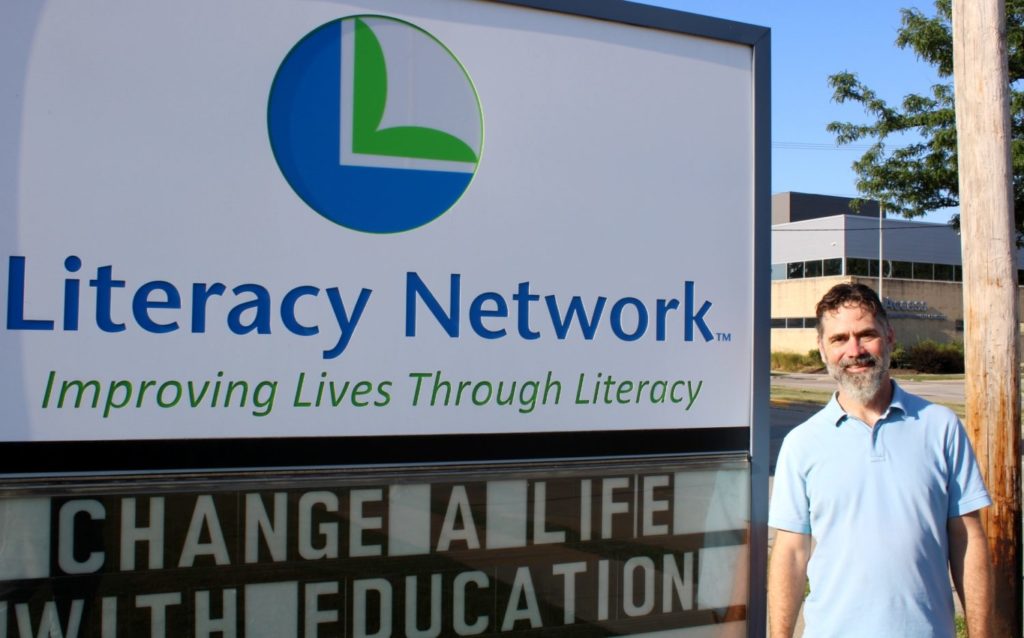
(Photo by David Dahmer)
In the past 14 years, Literacy Network has developed numerous partnerships to support adults and families, created nationally recognized programs, and has found a new home in a new, custom-designed learning center at 701 Dane Street in the heart of Madison’s south side.
“That was huge for us. That involved purchasing the building, renovating it, and then making it appropriate for our students and it’s been such a great thing to have,” Burkhart says of the move that happened in 2016.
“We’ve slowly been increasing the number of programs here since 2020. The move to a new building has been a game changer. One of my favorite memories was of the first time we opened the building to staff and to students just kind of seeing the looks on their faces when they first walked in and saw that this was their new home and had all of these great resources and spaces to work in.”
While Literacy Network works with teachers, tutors, volunteers and donors to improve adult literacy in Dane County, it has had its share of tough times, like most everybody else, during the COVID-19 pandemic. Their once bustling new facility became virtually empty.
“That was a little weird to get used to, “Burkhart says.
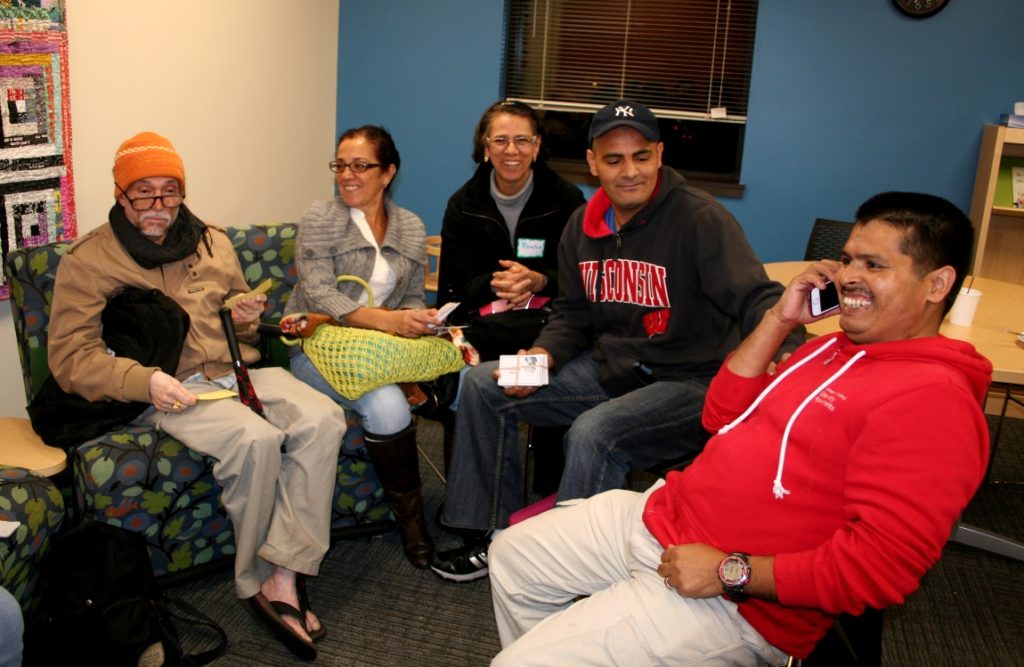
Beyond the new building, Literacy Network programs are hosted at numerous schools, libraries, community centers and partner agencies throughout Dane County and help adults find career opportunities, read with children and help with homework, improve computer skills, understand finances, and speak with doctors about health concerns.
“There’s a lot of things that I’ll miss. I’m going to miss the staff – they are wonderful. I’m going to miss the board. But, most of all, I’m going to miss seeing those firsthand experiences with all of these great people,” Burkhart says. “Just yesterday, a guy came in for the first time after getting his citizenship and the people at the front desk knew about it and they applauded for him. It’s just a really cool thing to be a part of. We’re a family here.
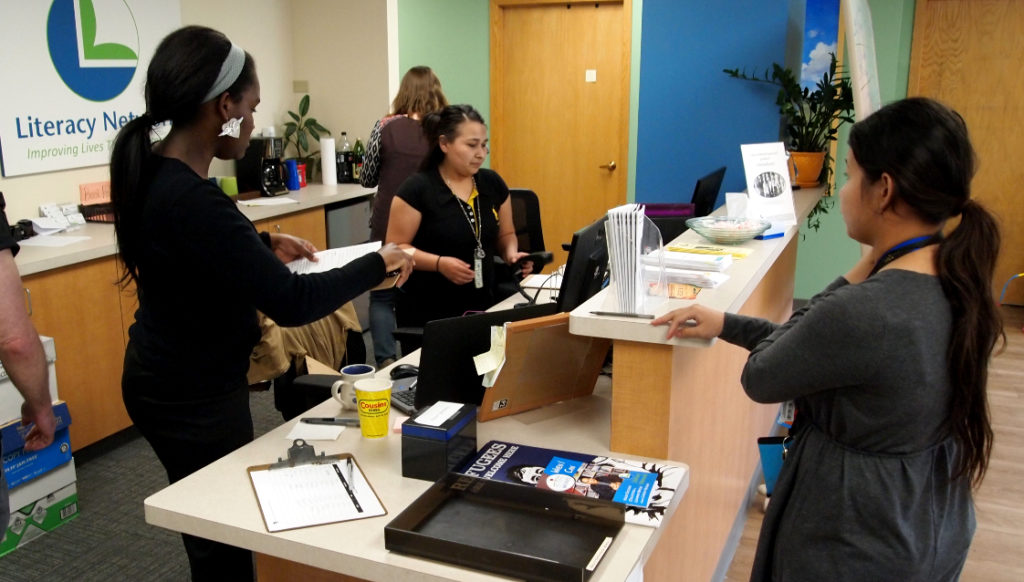
“I feel like we’ve really moved the needle in a lot of ways in these last 14 years. One of them is increasing the number of hours for students on a consistent basis, right up until the pandemic happened,” Burkhart says. “And then after 2020, we saw that we’re making those increases again. So there were some consistent steady increases in the average number of hours per student which is a good indicator for that long-term learning that we know is necessary for assistance with our students and making sure that they have the opportunities that they seek.”
Burkhart says that they’ve been able to do that by creating a really strong support network for their students. “Our student support services are really excellent and we continue to see greater needs among students. So there’s still more work to be done. We still need to add more staff in that area. But consistently seeing those numbers increase is a really amazing thing,” Burkhart says. “But I think where you really see the changes is in the individual stories that our students are able to share with us with folks being able to make bigger strides in their lives, getting their high school diploma, getting a certificate or degree, becoming a US citizen. That’s where the increased number of student hours makes a big difference because people are able to achieve their goals on a more regular basis.”
The Literacy Network board and staff have worked together to develop a transition plan and Burkhart says that he’s ready to help the organization with whatever it needs to make this transition as smooth as possible.
“I’m going to continue to build support for our programs and put plans in place for Literacy Network’s future,” he says.
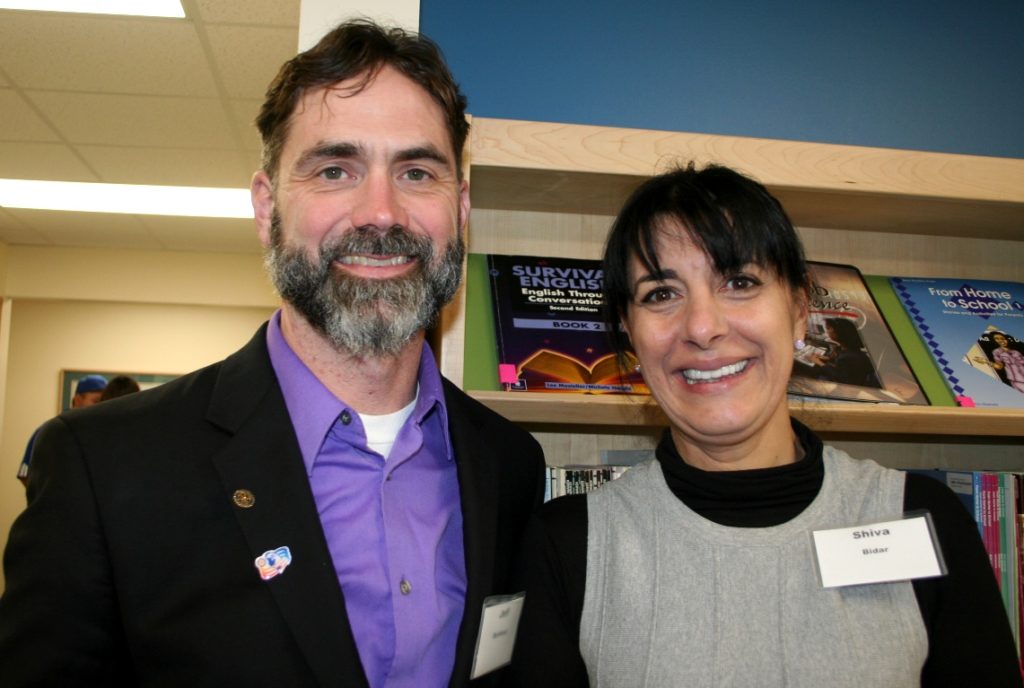
But what’s in his future?
“It’s a little vague for me even,” Burkhart says, smiling. “But I’m excited about to work towards building something different in my own life. I want to stay in the nonprofit sector; I want to help nonprofits to grow and thrive. It is definitely a big passion of mine and I want to continue to do that kind of work.
“I’ve got a little time. I’ll be here till the end of December or middle of December and I’ll be working on stuff on my own time and then we’ll see what happens,” he adds.
So it’s a very exciting time for Burkhart, but also still a little sad.
“It’s going to be really hard. I’ve gone through a lot of thinking processes and, and grieving, honestly, for losing something that I really love. It’s a choice that I’ve made and I’m really honored that we have a great board who stepped up to support the organization moving forward,” Burkhart says. “And we’re in a good place as an organization, so I’m happy to be able to support the next generation of leaders by giving all these things over to somebody to take it to the next level. And I think somebody can absolutely come into this job and just do amazing things. So I’m looking forward to seeing what happens next.”

































